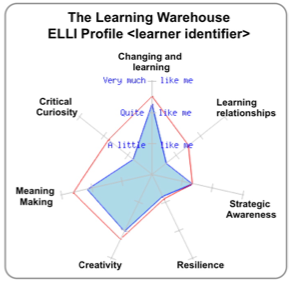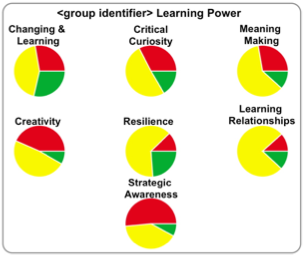April 26th, 2012PhD: Learning Analytics for Learning Power
Learning Analytics for Learning Power
Knowledge Media Institute, The Open University, Milton Keynes, UK
3 year fully-funded PhD (Oct. 2012-Sept.2015), Stipend: £40,770 (£13,590/year)
Supervisors: Simon Buckingham Shum & Rebecca Ferguson
Background
 Intrinsic motivation to engage in learning (whether formal/informal, or academic/workplace) is known to be a function of a learner’s dispositions towards learning. When these are fragile, learners often disengage when challenged, and are passive, lacking vital personal qualities such as resilience, curiosity and creativity needed to thrive in today’s complex world. Learning Analytics seek to improve learning by making the optimal use of the growing amounts of data that are becoming available to, and about, learners [1,2]. Dispositional Learning Analytics seek specifically to build stronger learning dispositions (note that these are not ‘learning styles’, which have a dubious conceptual basis [3]). One particularly promising approach models dispositions as a 7-dimensional construct called Learning Power, measured through self-report data [4]. A web application generates real time personal and cohort analytics, which have been shown to impact learners, educators, and organizational leaders, and the underlying platform pools data from >50,000 profiles, which in combination with other datasets, enables deeper analytics. As a form of Social Learning Analytic [5], in combination with Discourse-Centric Analytics [6-7] and Social Network Analytics for learning [8], our strategic goal is to provide a suite of analytics that can help learners grow in Learning Power, and ultimately, build their capacity as life-long, life-wide learners.
Intrinsic motivation to engage in learning (whether formal/informal, or academic/workplace) is known to be a function of a learner’s dispositions towards learning. When these are fragile, learners often disengage when challenged, and are passive, lacking vital personal qualities such as resilience, curiosity and creativity needed to thrive in today’s complex world. Learning Analytics seek to improve learning by making the optimal use of the growing amounts of data that are becoming available to, and about, learners [1,2]. Dispositional Learning Analytics seek specifically to build stronger learning dispositions (note that these are not ‘learning styles’, which have a dubious conceptual basis [3]). One particularly promising approach models dispositions as a 7-dimensional construct called Learning Power, measured through self-report data [4]. A web application generates real time personal and cohort analytics, which have been shown to impact learners, educators, and organizational leaders, and the underlying platform pools data from >50,000 profiles, which in combination with other datasets, enables deeper analytics. As a form of Social Learning Analytic [5], in combination with Discourse-Centric Analytics [6-7] and Social Network Analytics for learning [8], our strategic goal is to provide a suite of analytics that can help learners grow in Learning Power, and ultimately, build their capacity as life-long, life-wide learners.
PhD Challenge
 A key next step in this research programme is to harvest and analyse data from the traces that learners leave as they engage in social digital spaces, and to explore its relationship to other data sets and data streams. This PhD will therefore fund a technically strong candidate to design, implement and evaluate “Learning Analytics for Learning Power”. The project will deploy iterative prototypes in authentic use contexts, considering OU platforms as a starting point (e.g. SocialLearn [9]; Cohere [10]; EnquiryBlogger [11]), but open to data streams from new kinds of digitally instrumented interactions (e.g. from Pervasive Computing; Augmented Reality; Quantified Self). A possible outcome is an analytics architecture open to diverse forms of input, grounded in a theoretically robust framework, generating visual analytics with transformative power for reflective learners.
A key next step in this research programme is to harvest and analyse data from the traces that learners leave as they engage in social digital spaces, and to explore its relationship to other data sets and data streams. This PhD will therefore fund a technically strong candidate to design, implement and evaluate “Learning Analytics for Learning Power”. The project will deploy iterative prototypes in authentic use contexts, considering OU platforms as a starting point (e.g. SocialLearn [9]; Cohere [10]; EnquiryBlogger [11]), but open to data streams from new kinds of digitally instrumented interactions (e.g. from Pervasive Computing; Augmented Reality; Quantified Self). A possible outcome is an analytics architecture open to diverse forms of input, grounded in a theoretically robust framework, generating visual analytics with transformative power for reflective learners.
Seize the Day!
 This is a fantastic opportunity if you’re passionate about the future of learning and want to engage with next generation pedagogy. You’re already a great web and database developer, and now looking to develop a research career in Learning Analytics, one of the fastest growing topics in technology-enhanced learning. Your supervisors will be Simon Buckingham Shum and Rebecca Ferguson, who are active contributors to the field of Learning Analytics research.
This is a fantastic opportunity if you’re passionate about the future of learning and want to engage with next generation pedagogy. You’re already a great web and database developer, and now looking to develop a research career in Learning Analytics, one of the fastest growing topics in technology-enhanced learning. Your supervisors will be Simon Buckingham Shum and Rebecca Ferguson, who are active contributors to the field of Learning Analytics research.  The PhD will be in collaboration with learning scientists and practitioners in the global LearningEmergence.net research network, who are well placed to provide pedagogical input, user communities and impact evaluations. In particular, this work will be done in partnership with Ruth Deakin Crick, University of Bristol (Graduate School of Education & Centre for Systems Learning & Leadership), whose research into modelling and assessing learning power provides a foundational element for this project.
The PhD will be in collaboration with learning scientists and practitioners in the global LearningEmergence.net research network, who are well placed to provide pedagogical input, user communities and impact evaluations. In particular, this work will be done in partnership with Ruth Deakin Crick, University of Bristol (Graduate School of Education & Centre for Systems Learning & Leadership), whose research into modelling and assessing learning power provides a foundational element for this project.
Open U. is the place to do research in learning technology, this being an institutional mission-critical challenge. The Knowledge Media Institute is an 80-strong state of the art research lab, prototyping the future for the Open University and the many other organisations with whom KMi partners. KMi is renowned for its creative, can-do culture, and its high impact on the OU’s strategic thinking and technical capacity [Locate KMi]. The Institute of Educational Technology (where Rebecca Ferguson is based) is home to world leading research on learning technology, as well as conducting institutional research to inform the university’s core business. You will be part of a comprehensive doctoral training programme in computing and educational technology, participating in a dynamic research community, with opportunities to connect with groundbreaking people and ideas — limited only by your energy and imagination.
To Apply…
- Contact us if you have informal queries. We’re in Vancouver next week at the 2nd International Conference on Learning Analytics & Knowledge, or get in touch online for informal enquiries: s.buckingham.shum or r.m.ferguson atsign open.ac.uk.
- Read the background papers, and research technical approaches which will enable you to locate your ideas within the literature on learning analytics. See for instance the ACM Learning Analytics Conference (2011/2012), and SoLAR resources, and other research conferences around data mining and visualization.
- Open U. Research website gives an overview of the quality of research conducted here, and the Research Degrees Handbook which will answer many practical questions
- Draft a proposal outlining how you might tackle this challenge, highlighting which of the above approaches you might focus on, and the skills/experience that you bring (plus any that you recognise you will need to acquire). 4 pages max. This is not a binding document, but shows us how clearly you can think and write.
- Complete the PhD application form [Word doc]
- Email these with your CV and a cover letter, cc’ing Simon Buckingham Shum & Rebecca Ferguson, to: Ortenz Rose <O.Rose@open.ac.uk>
- Deadline 7 June: You will be competing for one of several studentships being offered across all KMi research topics.
Reading
- Ferguson, R. (2012). The State Of Learning Analytics in 2012: A Review and Future Challenges. Technical Report KMI-12-01, Knowledge Media Institute, The Open University, UK. http://kmi.open.ac.uk/publications/techreport/kmi-12-01
- Buckingham Shum, S. (2011). Learning Analytics: Dream, Nightmare or Fairydust? Keynote Address, Ascilite 2011: http://bit.ly/tqedko followed by a Networked Learning Conference 2012 online discussion: http://bit.ly/AfhqEv
- Coffield, F., Moseley, D., Hall, E. and Ecclestone, K. (2004). Should We Be Using Learning Styles? What Research Has To Say to Practice. London: Learning and Skills Research Centre, 1540/05/04/500. Eprint: http://www.arasite.org/RMdatabase/Coffield.pdf
- Buckingham Shum, S. and Deakin Crick, R. (2012). Learning Dispositions and Transferable Competencies: Pedagogy, Modelling and Learning Analytics. Proc. 2nd Int. Conf. Learning Analytics & Knowledge. (29 Apr-2 May, 2012, Vancouver, BC). ACM Press: New York. Eprint: http://oro.open.ac.uk/32823
- Ferguson, R. and Buckingham Shum, S. (2012). Social Learning Analytics: Five Approaches. Proc. 2nd Int. Conf. Learning Analytics & Knowledge, (29 Apr-2 May, Vancouver, BC). ACM Press: New York. Eprint: http://oro.open.ac.uk/32910
- De Liddo, A., Buckingham Shum, S., Quinto, I., Bachler, M. and Cannavacciuolo, L. (2011). Discourse-Centric Learning Analytics. Proc. 1st Int. Conf. Learning Analytics & Knowledge. Feb. 27-Mar 1, 2011, Banff. Eprint: http://oro.open.ac.uk/25829
- Ferguson, R. and Buckingham Shum, S. (2011). Learning Analytics to Identify Exploratory Dialogue within Synchronous Text Chat. Proc. 1st Int. Conf. Learning Analytics & Knowledge. Feb. 27-Mar 1, 2011, Banff. Eprint: http://oro.open.ac.uk/28955
- Haythornthwaite, C. and de Laat, M. (2010). Social networks and learning networks: using social network perspectives to understand social learning. In: 7th International Conference on Networked Learning (Aalborg, Denmark, 3-4 May 2010). Eprint: http://celstec.org.uk/system/files/file/conference_proceedings/NLC2010_Proceedings/abstracts/PDFs/Haythornwaite.pdf
- Ferguson, R. and Buckingham Shum, S. (2012). Towards a Social Learning Space for Open Educational Resources. In: Okada, A.; Connolly, T. and Scott, P., Eds.: Collaborative Learning 2.0: Open Educational Resources. Hershey, PA: IGI Global, pp. 309–327. Eprint: http://oro.open.ac.uk/33457
- De Liddo, Anna; Sándor, Ágnes and Buckingham Shum, Simon (2012, In Press). Contested Collective Intelligence: Rationale, Technologies, and a Human-Machine Annotation Study. Computer Supported Cooperative Work (CSCW). Eprint: http://oro.open.ac.uk/31052
- Ferguson, R., Buckingham Shum, S. and Deakin Crick, R. (2011). EnquiryBlogger: using widgets to support awareness and reflection in a PLE Setting. 1st Workshop on Awareness and Reflection in Personal Learning Environments. PLE Conference 2011, 11-13 July, Southampton, UK. Eprint: http://oro.open.ac.uk/30598


April 26th, 2012 at 5:41 pm
[…] background-position: 50% 0px ; background-color:#222222; background-repeat : repeat; } http://www.open.ac.uk – Today, 5:41 […]
April 26th, 2012 at 7:49 pm
[…] background-position: 50% 0px ; background-color:#222222; background-repeat : no-repeat; } http://www.open.ac.uk – Today, 7:49 […]
April 27th, 2012 at 11:08 am
[…] SocialLearn Research Blog » Blog Archive » PhD: Learning Analytics for Learning Power Seize the Day! This is a fantastic opportunity if you’re passionate about the future of learning and want to engage with next generation pedagogy. You’re already a great web and database developer, and now looking to develop a research career in Learning Analytics, one of the fastest growing topics in technology-enhanced learning. Your supervisors will be Simon Buckingham Shum and Rebecca Ferguson , who are active contributors to the field of Learning Analytics research. The PhD will be in collaboration with learning scientists and practitioners in the global LearningEmergence.net research network, who are well placed to provide pedagogical input, user communities and impact evaluations. […]
April 27th, 2012 at 1:24 pm
[…] details SocialLearn Research blog… This entry was posted in Language for Learning, Learning Power, Pedagogy, Projects, Software […]
April 28th, 2012 at 1:14 am
[…] background-position: 50% 0px ; background-color:#222222; background-repeat : no-repeat; } http://www.open.ac.uk – Today, 1:13 […]
May 10th, 2012 at 5:00 pm
I’m two years away from being in a position to apply to become a PhD student with a final module of the MAODE to complete, however, the topic and the challenge is compelling and the environment one I feel familiar with having first attempted to migrate CD based interactive learning online in 1999 and originally started the MA in 2001.
November 5th, 2012 at 3:16 pm
[…] "Intrinsic motivation to engage in learning (whether formal/informal, or academic/workplace) is known to be a function of a learner’s dispositions towards learning. When these are fragile, learners often disengage when challenged, and are passive, lacking vital personal qualities such as resilience, curiosity and creativity needed to thrive in today’s complex world. Learning Analytics seek to improve learning by making the optimal use of the growing amounts of data that are becoming available to, and about, learners " […]
November 22nd, 2013 at 11:06 am
[…] […]